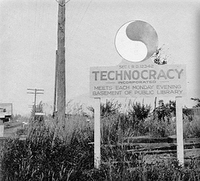Weaknesses of Technocracy
This Movement Is So Over
 The technocratic movement was a social movement in the United States during the 1920s and 1930s that advocated a form of society where the welfare of human beings is optimized by means of scientific analysis and widespread use of technology. I think technocracy, as a movement, was attractive as long as there was a growing suspicion that capitalism would not survive the depression - if in fact, it had not caused it. In any event, after World War II evaporated the depression, Technocracy immediately lost its 'bloom'
The technocratic movement was a social movement in the United States during the 1920s and 1930s that advocated a form of society where the welfare of human beings is optimized by means of scientific analysis and widespread use of technology. I think technocracy, as a movement, was attractive as long as there was a growing suspicion that capitalism would not survive the depression - if in fact, it had not caused it. In any event, after World War II evaporated the depression, Technocracy immediately lost its 'bloom' What are the weaknesses of theocracy and the theocracy movement? In the first place the moment is too obscure to attract much criticism. But knowledgable critics make the following claims regarding technocracy:
What are the weaknesses of theocracy and the theocracy movement? In the first place the moment is too obscure to attract much criticism. But knowledgable critics make the following claims regarding technocracy:- There is no possible way to eliminate the scarcity of products in the modern world, especially given the large variety that exists today.
- The theory that labor time could be drastically reduced at current productivity levels seems extremely suspect given the low unemployment rate in modern Western societies.
- The movement lacks organization and a clear path.
- Technology cannot solve all of our problems.
- Naturally scarce things (e.g. gold, diamonds, the Mona Lisa) are impossible to distribute equally.
- Many people believe that human beings are materially selfish and would not be willing to work unless that work gave them some direct material benefit; thus the technate would fail to function due to a shortage of labor.
This post has been post-dated due to continued discussion.





